
Since its inception in 1978, the Lumen Christi Award, presented by Catholic Extension Society, has been given to people who radiate and reveal the light of Christ present in the communities where they serve.
Each year, the recipient is selected from a pool of nominees, sent in by Extension Dioceses that recognize their incredible work. This year’s group of 37 nominees are leading people closer to God and transforming communities located in the poorest regions of America. Their stories showcase the mission of the Church in action.
Arecibo | Baker | Beaumont | Belleville | Birmingham | Boise | Crookston | Davenport | Dodge City | Duluth | Our Lady of Lebanon | Our Lady of Nareg | St. Maron of Brooklyn | St. Josaphat in Parma | Fairbanks | Gallup | Gaylord | Grand Island | Helena | Knoxville | Laredo | Las Cruces | Lexington | Little Rock | Lubbock | Memphis | Mobile | New Ulm | Ponce | Rapid City | San Bernardino | Savannah | Springfield-Cape Girardeau | Steubenville | Superior | Tucson | Yakima
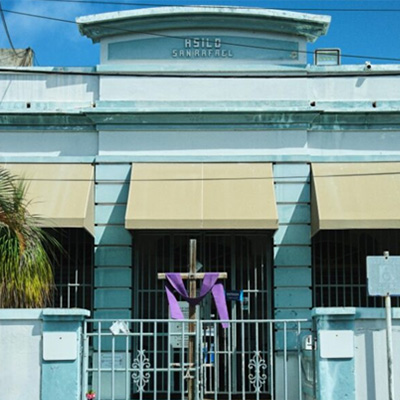
San Rafael Geriatric Center | Diocese of Arecibo, Puerto Rico
Puerto Rico center affectionately cares for the elderly poor
The San Rafael Geriatric Center is a nonprofit institution operating as a home for the elderly in Arecibo, Puerto Rico. From its beginnings in 1925, the center’s mission has been to uplift the elderly poor and see to it that their basic human dignity is ensured. Managed by the Daughters of Charity of Saint Vincent de Paul, this dedicated team of Catholic sisters, along with staff and volunteers, works tirelessly to bring the mercy of Jesus by providing compassionate care and services. After working with the sisters at the center, one young woman was so moved by their gentle care for the poor that she discerned a call to join the Daughters of Charity herself.
Today, the San Rafael Geriatric Center is one of only two nonprofit facilities in Puerto Rico that provides affordable services to elderly individuals. Its residents receive shelter, food, medical assistance, occupational and physical therapy and recreational activities. Services are tailored to meet each resident’s individual needs.
-
Read more
Beyond basic care, the San Rafael Geriatric Center offers its residents a Catholic presence and the opportunity for spiritual growth. The sisters lead daily prayers and offer the Eucharist. They also provide spiritual accompaniment up until the residents’ last moments. Families in Arecibo choose to take their loved ones to San Rafael because it’s a comforting, faith-centered environment.
With a history of serving hundreds of high-risk elderly individuals and influencing thousands of volunteers, the San Rafael Geriatric Center is highly regarded for its affectionate care. It has been recognized for excellence by the Social Services Department in Puerto Rico and the Rotary Club of Arecibo. Bishop Alberto Figueroa Morales has said he is grateful for the center’s dedication to “inspiring hope and igniting change in the residents where their joy of life is preserved while increasing their desire for eternity.”
At the first World Day for Grandparents and the Elderly, Pope Francis said, “The entire Church is with you … cares about you, loves you and does not want to leave you alone!” San Rafael Geriatric Center, with Catholic sisters leading the way, truly embodies this teaching. It is a place that sets a wonderful example for the entire community of how to treat the elderly poor with dignity and love in their final chapters of life.
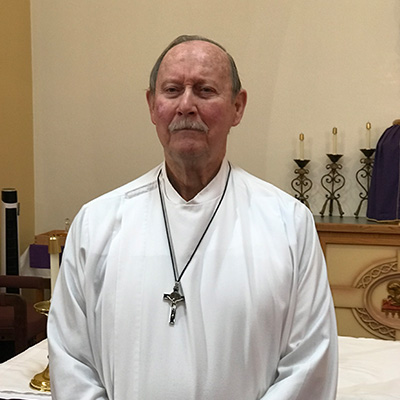
Gary Thompson | Diocese of Baker, Oregon
Oregon judge tackles drug prevention with empathy and mercy
Gary Thompson was just five years old when St. Joseph’s Church in Prineville, Oregon—built with support from Catholic Extension Society—was dedicated in 1951. As an active youth in the parish, it was no surprise that Thompson would go on to serve the community in several ways, including as district attorney, district judge and circuit court judge. Thompson, now 78, has dedicated a lifetime to building up his hometown faith community.
Thompson’s impact promoting hope and dignity for all Oregonians extends beyond the legal realm as he directs St. Vincent de Paul of Crook County, the primary pantry for an area spanning over 2,900 square miles. He leads efforts that provide essential assistance to those in need, including food, rent, utility and transportation aid. Thompson is driven to ensure the ministry remains focused on bringing God’s love to the poor.
-
Read more
During his time as judge from 1990 to 2008, Thompson sponsored drug-prevention legislation and rehabilitation programs with strong community support. His advocacy efforts paved the way for approaching the criminal justice system with empathy—such as pioneering “drug courts.” These treatment programs were implemented nationwide during the 1990s as effective alternatives to incarceration for first-time offenders. By connecting them to treatment and services crucial for recovery, drug courts have proven to help people get their lives back on track. Thompson drafted proposals to bring drug court programs into the state, with active programs thriving in nine counties today.
This came well before the state’s recent drug-reform laws that have exacerbated the drug crisis in Oregon. The merciful initiative of drug courts was ignited by Thompson’s compassionate leadership. One long-time friend regards Thompson as always “counseling wisely and with a passion for his faith.”
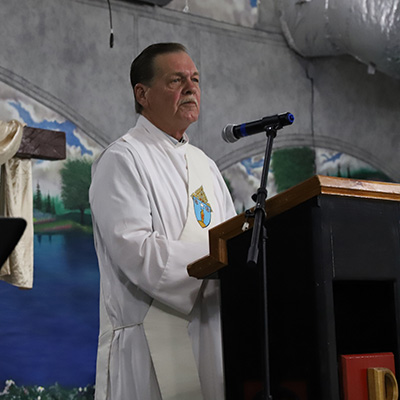
Deacon Stephen Sellers | Diocese of Beaumont, Texas
Texas deacon teaches death row inmates that hope must start somewhere
When newly ordained Deacon Stephen Sellers first visited death row at Polunsky Unit prison in 2017, he wasn’t sure he could handle returning. “I went back out in the parking lot and prayed that God would never send me back there again,” Deacon Sellers recalled.
Prison, as Deacon Sellers described it, is “a world inside our world.” Several inmates have never felt love in their lives. Many of the inmates on death row have been disowned by their families for their actions. It is easy for people to allow them to rot for what they have done.
Deacon Sellers feared he’d be too sorry and compassionate for the ministry—in a “pool of tears,” as he put it. But he has since found it to be one of the most beautiful ministries because amid the incredible, seemingly endless darkness he sees in the jails, there is still light.
-
Read more
“It’s a truly dark place. But I guess in a darker place, it’s easier to see the light of Christ,” said Deacon Sellers.
Over the last 10 years, Catholic Extension Society has supported prison ministries in 56 dioceses across the United States. Although often hidden to the outside world, these ministries are helping inmates make important internal transformations.
Prison ministry is helpful to societal well-being as it has been shown to be an effective tool in reducing recidivism. These are intervention programs put in place by the criminal justice system that aim to lessen the likelihood of convicted criminals re-offending. According to a study published by the Texas Department of Criminal Justice in 2022, recidivism rates for the Texas inmate population continue to be among the lowest in the country, with rates of repeated criminal activity coming in at only 20.3 percent.
Faith-based programs in our prisons have been transforming lives for the better, especially in East Texas. Deacon Sellers has put around 105,000 miles on his truck driving to serve the inmates at the Polunsky and Stiles prisons in East Texas. He brings them the Sacraments, teaches OCIA classes, and preaches to and counsels any willing to listen. He especially appreciates their curiosity.
“When they’re able to talk to someone, they’ll ask you 10,000 questions,” Deacon Sellers said. “One thing I’ve learned about being Catholic is that when you try to teach it, you learn a whole lot more.”
And Deacon Sellers has made it his mission to let each of these prisoners know that despite their past sins and mistakes, God is loving and forgiving. They need to start asking for forgiveness. But first they must forgive from within.
“Sometimes it’s about forgiving ourselves,” Deacon Sellers said. “And I’m not trying to, especially in the prison, give them a, so to speak, get-out-of-jail-free card. Certain things caused what we are and what we’ve done. If God forgives us, then we need to forgive ourselves and start somewhere.”
Through his unconditional love, Deacon Sellers shines a light for these men in the direction of newfound hope.
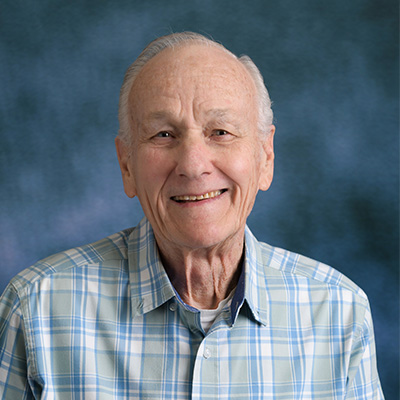
Louis Slapshak | Diocese of Belleville, Illinois
Southern Illinois man helps ex-prisoners stay out of jail through full-service aid and prayer
Louis Slapshak is a lifelong resident of Belleville, Illinois, and has extensively volunteered in various roles at his parish, Our Lady Queen of Peace. Through his work in social concerns at his parish, Slapshak met former Lumen Christi Award recipient Joe Hubbard. Hubbard received the Catholic Extension Society honor in 1983 for his work among the urban poor in the Diocese of Belleville. Inspired, Slapshak then began volunteering himself with Catholic Urban Programs and the Society of St. Vincent de Paul.
In 2008 Slapshak’s journey in urban services led him to become the assistant coordinator for prison ministry, providing religious services to eight state prisons, a federal prison, several work camps and jails located across the 28 southern Illinois counties that comprise the Diocese of Belleville.
-
Read more
In his years of working in this ministry, he recognized the challenges facing ex-prisoners after their release. Many were hesitant and unsure about how they would transition back into society after several years in jail. To address this, Slapshak co-founded Our Brothers’ Keepers of Southern Illinois (OBK) in 2018, which offers holistic reentry services including housing, counseling, life skills training and employment support.
The profound compassion Slapshak exudes at OBK has fostered feelings of belonging and growth among those reentering society in the greater East St. Louis metro area. He drives clients to appointments and to secure essential items, offers emotional support and prays with them. Despite the high crime rates and poverty in the area, OBK successfully serviced 230 clients in the past three years with a recidivism rate of only 3%. Several prisoners have noted that without the reentry program launched by Slapshak, they’d likely be back in jail.
Slapshak also ensures the continuity of OBK by emphasizing the power of faith in transforming lives. OBK board member Richard Crosby shared that during an internal review of OBK’s program services, Slapshak noted that its documentation forms for client interactions didn’t acknowledge the spiritual support component of OBK’s work. He went on to further stress the importance of this support as part of the ministry’s mission. This is a small but powerful instance that showcases Slapshak’s unwavering commitment to “centering all of us on a faith-based approach.”
Slapshak’s faith has transformed OBK and its members. While OBK serves individuals of all faiths, it introduces many to the tenets of the Catholic faith and encourages a deeper exploration of their spiritual beliefs. OBK brings the word of God to the incarcerated, often for the first time in many years.
Bishop Michael McGovern praises Slapshak’s lifetime of volunteer service: “Then, and today, Lou has been a driving force in answering the Gospel call to serve those imprisoned, and we are blessed by his ministry. … He truly cares and brings the love and compassion of Jesus into their lives.”
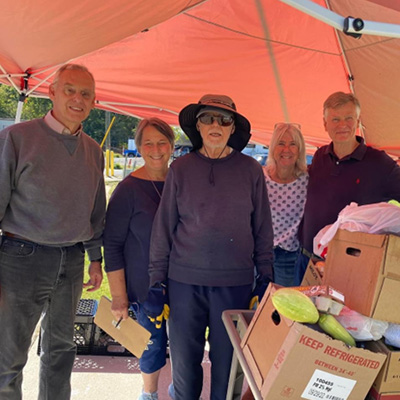
Holy Rosary Catholic Church Food Pantry | Diocese of Birmingham, Alabama
This Alabama food pantry feeds the hungry, keeps teens off the streets and changes lives
Holy Rosary Catholic Church, founded 132 years ago by immigrant steel and glass factory workers, has evolved into a diverse community embodying the Catholic faith in their ministry to serve the poor. Holy Rosary serves the Gate City neighborhood—one of the poorest neighborhoods in Birmingham—where many families live on fixed incomes. The church offers a food pantry that feeds more than 670 families twice each month. Each day this vital community fixture does God’s work nourishing people physically and spiritually.
Holy Rosary’s food pantry is one of the largest in Birmingham. A 19 percent rise in prices and the expiration of federal pandemic safety nets has exacerbated financial hardships for many Gate City residents, creating increasing dependence on the food pantry for life-sustaining groceries and basic supplies.
-
Read more
The pantry’s building houses a new cooler, an assembly line for food storage and an active clothing and material supply area. Holy Rosary Food Pantry remarkably served nearly 2,000 people last December alone.
The volunteers discover joy through service, motivating them to give of their time each day. One volunteer, Cassandra Palmer, said the food pantry is a rewarding experience for her, knowing she is impacting lives. “As a retired teacher, volunteering gives me an opportunity to remain active, to give of my time, talent and my treasure. I know I can’t help everybody, but it gives me joy to be able to help somebody. I feel that God uses us to reveal His ability to provide for His creation.”
Coach Allen Murphy, a full-time pantry employee, formerly led youth programs ranging from sports to reading and tutoring sessions. Youth today have opportunities through the pantry organization to participate in a soccer league program at Holy Rosary and hear advice from role models like Coach Murphy. What has kept Coach Murphy going? Providing a safe environment for youth to develop positive behaviors and skills to keep them away from joining gang violence surrounding them.
“I tried to instill something in them: to be positive in life,” Coach Murphy said.
Many Gate City kids that grew up attending Holy Rosary have gone into fulfilling jobs. One woman works for the health department in Birmingham. Another woman, who participated in the parish’s soccer program, now works as a manager for NorthStar Soccer Ministries. This organization uses soccer as a ministry tool to instill self-confidence and social skills among urban youth in Birmingham who otherwise wouldn’t have the opportunity to participate in a sports program.
Holy Rosary Food Pantry goes beyond providing physical nourishment—it embodies the essence of Catholic social teaching, promoting the common good and fostering a community where all are welcome and cared for. Dedicated volunteers serve each day with genuine love for their neighbor. Volunteer Tracy Bragg sums it up perfectly: “The food pantry has been the greatest gift from God. This community, both volunteers and clients, is often a glimpse of God’s kingdom, and you can see the sincerity and goodness of each person.”
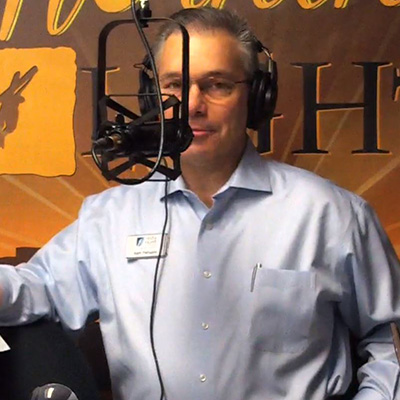
Keith Pettyjohn | Diocese of Boise, Idaho
Catholic radio program delivers Christ’s message through the airwaves
Keith Pettyjohn is the founder and president of Salt & Light Radio, a Catholic radio network comprising four stations in Idaho that reach 140,000 people. It is an apostolate of the Diocese of Boise, Idaho.
Pettyjohn, who is known to all as a humble, devoted Catholic, was first exposed to Catholic radio while visiting Washington State for business in 2007. Enthralled with the prospect of bringing Catholic radio to Idaho, he set out to organize a working group to establish the first Catholic radio stations in his home state. In the depths of the economic recession, he took two years to raise the funds necessary to acquire Salt & Light Radio’s first two AM stations. Today, two of the radio stations are in English, and the other two are Spanish.
“The Catholic radio station is especially impactful to our growing Hispanic population, many of whom rely on it for their main source of information,” said Bishop Peter Christensen of the Diocese of Boise.
-
Read more
The mission of the radio network is “to evangelize and teach, through multi-media communications, the Gospel of Jesus Christ, with the fullness of Truth of the Catholic Church. We strive to be Salt & Light (Mt 5:13-16) to all: to promote and build up Christ’s body, the Church.”
This important ministry reaches homebound seniors, rural isolated communities and even prisoners. It helps people feel engaged with Pope Francis and the larger Church. The radio program has received many letters and calls from listeners telling them it brought them back to the faith or helped them discover their faith. One person wrote, “After listening to Salt & Light, I have a better understanding of my Catholic faith. Now when I receive the Holy Eucharist, I truly feel the presence of Christ.” Another said, “You guys are so wonderful! Thank you, thank you, for my conversion to the faith!”
Salt & Light Radio also offers several locally produced programs, featuring clergy and faith leaders from across the diocese. Salt & Light covers diocesan events, such as special Masses and local high school games. It sponsors family-oriented conferences. It also sponsors a literacy and family day for the Hispanic community, an event expected to draw over 1,000 attendees this year.
“Led by Keith Pettyjohn, Salt & Light Radio has had a tremendous impact on Catholics and non-Catholics alike in the Idaho community,” said Bishop Christensen.
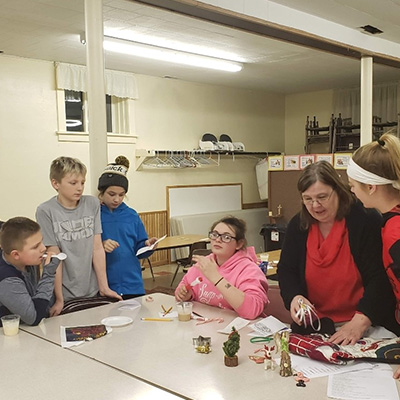
Janet Lhotka | Diocese of Crookston, Minnesota
Children on Minnesota’s White Earth Reservation grow in faith through woman’s love and commitment
For over 40 years, Janet Lhotka has served her parish of St. Ann Church in Waubun, Minnesota, where her involvement spans secretarial duties, bookkeeping and most notably coordinating the religious education program—called the Tekakwitha Center. This religious education program serves a cluster of six remote parishes, including St. Ann’s in Waubun, St. Frances Cabrini in Elbow Lake and St. Anne in Naytahwaush, each of which has received past support from Catholic Extension Society.
Lhotka has been involved with the religious education center since her children participated. Now, her grandchildren are learning about the Catholic faith through the Tekakwitha Center. She has firsthand knowledge of how a quality religious education program can foster the faith of families for generations.
-
Read more
The Tekakwitha Center consistently impacts over 100 children and youth from 45 families annually. Lhotka staffs information tables at school open houses and engages with families to encourage them to send their children to grow in knowledge and faith at Tekakwitha Center. She also recruits and trains catechists, currently guiding 15 volunteers, and teaches various grade levels, filling in whenever necessary.
Father John Cox, OMI, pastor of St. Ann, commends Lhotka’s sacrifices for the Tekakwitha Center. The Native American communities she serves in the area are no stranger to struggle, facing high unemployment and addiction rates. Often, grandparents are the primary caregivers of grandchildren.
Through her organization of Vacation Bible School in the village of Naytahwaush, Lhotka supports several grandmothers on the reservation who raise their grandchildren. In recent years, Lhotka adapted the program to at-home learning and posted supplemental content online to facilitate family conversations. Father Cox said her creativity “exemplifies how deep her faith is and her commitment to share it with others.”
Beyond religious education, Lhotka lends herself to leading several roles in parish events and liturgical ministries, as well as serving on the parish/finance council.
While many have benefited from Lhotka’s leadership, she feels she learns a great deal from those she serves: “Many people passed on to me the Catholic faith. Helping others, sharing with them in their everyday lives, is the most meaningful and rewarding way I can share my faith.”
Father Cox said, “I don’t know anyone who does as much for as many people as Janet Lhotka, freely and from her heart. Her reward will be great in heaven. It’s the only one she seeks.”
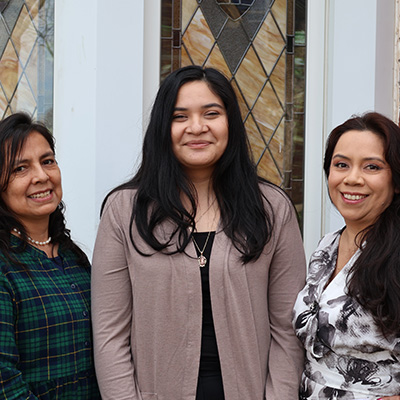
Diocese of Davenport Immigration Office | Diocese of Davenport, Iowa
Immigration office walks with tens of thousands on journey to citizenship
In a modest, unassuming office in southeast Iowa, families come from all over the world and share the stories of violence and devastation that have brought them to America, seeking safety and the opportunity for a better life. They come to the Diocese of Davenport’s Immigration Office, and the loyal staff that have served here for decades have grown accustomed to these heartbreaking tales.
Founded in 1975, the Diocese of Davenport’s Immigration Office helps families from all over the world reunite and begin a new life in America. They have processed conservatively over 10,000 clients directly—navigating the complex immigration process with kindness and unwavering support—but the number of people who have had their lives changed for the better is at least triple that amount.
-
Read more
The office currently employs two United States Department of Justice accredited immigration counselors, Gricelda Garnica and Karina Garnica, who have been in their positions for over 25 and 20 years respectively. They both began as administrative assistants and then in turn completed training to become Department of Justice approved counselors. The counselors have provided continuity of care, which is critical when the entire process from initial petition to attaining citizenship may take 15 to 20 years. Kent Ferris, director of social action, is the administrator, Glenn Leach has been a volunteer for decades and Vanessa Torres is an administrative assistant.
“Most immigrants are coming here for a reason; they come escaping crime, looking for a better life and safety for their family and their kids,” said Gricelda Garnica. “My job is to help them obtain the American dream.”
One family served by the office had their home bombed in Myanmar—a casualty of the civil war that has been raging in the country for over seven decades. The mother and father each took a small child and ran together. The grandmother took the infant child and fled in a different direction, and the family was tragically separated. The parents came to the United States as refugees, not knowing if the grandmother and their baby had survived. They began to work with the Immigration Office to obtain legal status. After 16 years the parents found, at last, the lost grandparent and child, and once again they came to the Immigration Office so the entire family could become legal, permanent residents.
The Immigration Office presents “Know Your Rights” workshops, serves as panelists at parish and university presentations, is active in social action and advocacy for immigration and refugees, and hosts foreign consulates so clients can have easier access to vital offices. One retired priest, upon seeing the multitude of families patiently waiting under shade trees at the chancery for their turn to meet with visiting consulate staff, remarked that it looked like what he imagined to be the multitude gathering to hear and be fed by Our Lord.
Archbishop Thomas Zinkula, former bishop of Davenport and current archbishop of neighboring Dubuque, said, “Providing legal immigration services not only provides essential services to those in great need, but also models our Church’s commitment to welcoming the stranger, which is so important in these times.”
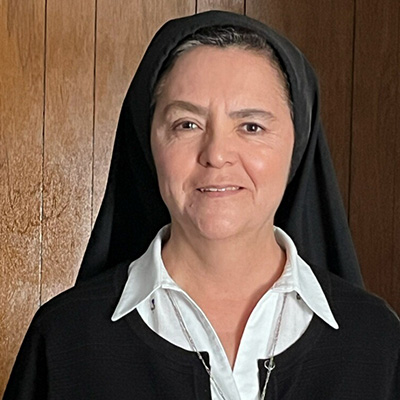
Sister Petra Palau Oviedo | Diocese of Dodge City, Kansas
Nun lives out of suitcase to extend embrace of the Church
Sister Petra Palau Oviedo is relatively new to southwest Kansas. A sister of the Mexico-based Missionaries of Charity of Mary Immaculate (MCMI sisters), she arrived in the Diocese of Dodge City, Kansas, in May 2023. The MCMI sisters—who have been in Kansas since 2002—relocated to the eastern part of the diocese in recent years to serve growing Hispanic communities. However, there is no Mass offered in Spanish, and the only ties to parishes for families have been through their children’s sacramental preparation.
During her first months, Sister Petra developed a plan of how she would provide outreach to the parishes in the area. She arrived in the United States with a wealth of experience—degrees in sacred scripture and psychology from the University del Valle of Mexico, not to mention 40 years as a Catholic sister building up faith communities. Despite being in an entirely new country, she did what she knew to be the most effective way to engage the people and invite them into their parish community: simply meet the people where they’re at.
-
Read more
Sister Petra has identified host families in each of the five communities she serves. It is in these homes where she meets with families and engages with them on what they want for the Church. She listens to them and finds out how the Church can best serve them. It is in this way that Sister Petra is building the Church. She does not wait comfortably for people to come to her. By finding the people and taking the time to visit and check in, Sister Petra is truly going out and extending the embrace of the Church to those that are longing to be recognized.
Since starting these visits, Sister Petra has begun to help the families she serves grow in their faith. Whether its programming Bible studies, reflecting on the sacraments or simply teaching people how to pray, Sister Petra is inviting all to encounter God each day.
But again, the people have simply grown to love her presence. They see her walking around town and are excited when she comes to visit. Even the parishioners who do not speak Spanish have commented that having a religious sister in the community is a great witness to the faith. Sister Petra’s work will touch thousands as she continues on during her time in Kansas. She wants to fill them with faith and love, and she sets that example beautifully.
“Faith, hope and love, when shared, leave a faithful, grateful and fruitful heart in the life of every Catholic,” Sister Petra said.
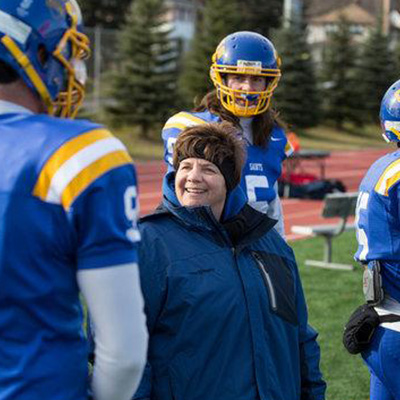
Sister Lisa Maurer, OSB | Diocese of Duluth, Minnesota
Nun coaches college players on football and faith
Although the sight of a nun passionately coaching on the sidelines might come as a surprise to most, Sister Lisa Maurer, a member of the Benedictines of the St. Scholastica Monastery, is a beloved and trusted figure for her team, for the College of St. Scholastica and for the entire Diocese of Duluth in northeast Minnesota.
The double vocations naturally go hand in hand for the Minnesota-born sister whose father coached the same sport. Sister Lisa worked professionally as a teacher and coach of volleyball, basketball and softball in her hometown of Sleepy Eye when she began to discern a new path in life. It was not long after she joined her religious community that she began attending the football practices and games at the college next to the monastery.
The athletic staff took notice of her keen interest in the sport and in the well-being of the students, and in 2015 she was asked to become an assistant coach.
-
Read more
She coaches young men far beyond the tactics of football; she guides them in their personal and spiritual lives, helping them understand that faith is not something that remains inside the walls of a church. She holds a prayer service for the players before every game.
“Over the past nine years, she has attended daily practices and is on the sidelines at every game, home or away,” said Barbara McDonald, president of the College of St. Scholastica. “Many of the players consider Sister Lisa their prayer partner and spiritual advisor, and she makes it a habit of checking in with the young men, particularly those who may be struggling with personal issues.”
She has found that young people feel comfortable speaking to her because of her role as a coach. It opens pathways for discussions on the struggles of real life.
“I think as a coach, because it’s not real life and it’s not life or death, but it’s real-life application of how we live as people. I always think through sports you can speak in a more real way to kids about things because it’s putting things into action. … You can call them to task much easier, or you can give an example much easier. And so to me, sports and religion really go well together. They use examples of athletes quite frequently in the Bible.”
Sister Lisa doesn’t just serve the football team; she is committed to each student-athlete across the college’s 22 athletic programs. Every year she provides a special prayer service to each team at the beginning of their season that includes the blessing and distribution of religious medals of St. Benedict.
One of the key messages she shares with student is what she calls the “four plays for a good life.” They are hospitality, stewardship, respect and justice.
“Those four plays you can run all day, every day of your life. At work, at school, at home, if we’re intentional about living those things, they can help us tackle whatever comes our way with joy. I believe that if you live your life in values, that’s a joyful life,” she said.
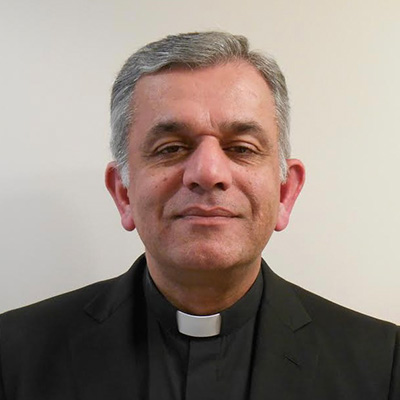
Rev. Albert Constantine | Eparchy of Our Lady of Lebanon
Economist-turned-priest is administrative backbone for Catholic Lebanese faith communities
Working behind the scenes doesn’t sound glamorous.
But how many great athletes would be who they are without their coach? How many compelling liturgies could go on without a dedicated sacristan? And how many beautiful family meals would there be without a mother handling the details?
Bishop Elias Zaidan, bishop of Our Lady of Lebanon, knows this. His Maronite Eparchy stretches from Ohio to California. An eparchy is an ecclesiastical unit in the Eastern Christian Church that is equivalent to a diocese in our own Western Christianity. But the bishop could not minister to his people without the service of Father Albert Constantine, the indispensable man behind the scenes.
-
Read more
Father Constantine comes to this naturally. To say that he is well-traveled would be an understatement. He was born in Lebanon and raised in Nigeria. He went to high school in England and college in the United States, and he is an economist by training.
This rich background has prepared him for his numerous and demanding job responsibilities. He serves as the chancellor, tribunal coordinator, tribunal assessor, member of the priests’ retirement fund board, and spiritual advisor of the National Apostolate of Maronites.
Such a portfolio demands world-class organizational skills, a lively intelligence, patient endurance, attention to detail and a singular focus that always keeps the big picture in mind. Father Constantine has all this and more.
But what makes him such a great gift is that he knows he is blessed. He comes from a humble background where piety, hard work and service to others were expected and encouraged.
Father Constantine explained: “From a young age, my siblings and I were taught that we were blessed beyond measure, and we were expected to do all we can to help others by being of service to them—regardless of our limited abilities. Serving the Church, in my very limited way, is the honor of a lifetime, and I will never be able to do enough to repay God for the extraordinary gift of the priesthood.”
Bishop Zaidan knows what a gift Father Constantine is. He said, “Father Albert’s humble and steadfast dedication to working behind the scenes of our Eparchy is an important example to the Church. He is so compassionate towards the clergy and laity alike. Actually, he goes out of his way to assist others.”
Working behind the scenes doesn’t sound glamorous, but coaches, sacristans, moms and bishops know that it is those who are behind the scenes who make things happen.
Father Constantine’s quiet contributions to the smooth administration of the Eparchy allow the frontline missionaries and priests to bring the gospel message to others.
And that is what really matters.
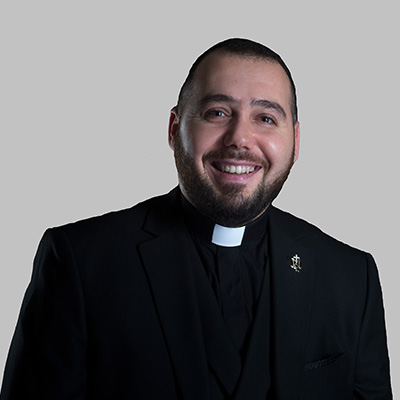
Father Ghazar Bedrossian | Armenian Catholic Eparchy of Our Lady of Nareg
Energetic Armenian pastor motivates youth to embrace faith
St. Mother Theresa of Calcutta once said, “We can do small things with great love.”
This famous quote guides Father Ghazar Bedrossian in his mission to serve the Armenian community at his parish in the Armenian Catholic Eparchy of Our Lady of Nareg. Ordained in 2013, the now 40-year-old pastor is already making a profound impact at Holy Cross Armenian Catholic Church in Belmont, Massachusetts, by emulating Christ’s love in his interactions with parishioners and engaging them spiritually.
Since his arrival at the parish two years ago, Father Bedrossian has demonstrated an empathetic approach to the individuals and families he serves. He is a spiritual director to the youth, a consultant in marriage and family life and the vocations director for the eparchy. In these roles, Father Bedrossian connects with young adults spiritually and personally by listening, talking to, praying with and encouraging them on their respective journeys. He recognizes them as the future of the Church, and this recognition has contributed to his desire to create more youth events at the parish.
-
Read more
At the heart of his mission also lies the commitment to preserving Armenian spirituality and cultural heritage. An accomplished singer, Father Bedrossian has used music to his advantage in engaging his parishioners. He has sung before Pope Benedict XVI and continues to take vocal lessons, earning him praise from the Armenian community. That he excels in every aspect of his life is an understatement—he also speaks five languages.
Father Bedrossian is sowing the seeds to build a vibrant parish in the eparchy. He has integrated many ways to promote the spiritual growth of his parish, embodying St. Mother Theresa’s philosophy in his substantial actions. He is a priest filled with love and great hope for the future of the Church.
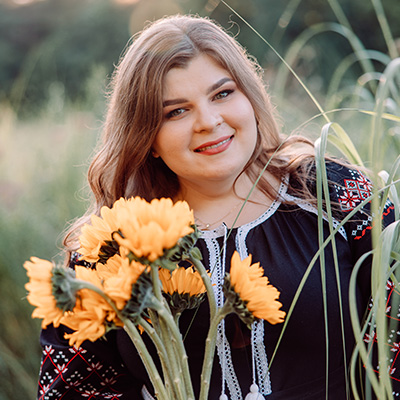
Olena Korendii | Ukrainian Roman Catholic Eparchy of Saint Josaphat in Parma Ohio
Lay leader unites Ukrainian youth across states
Olena Korendii has an old soul. Her birth certificate says she is 29. But her impact and vision are that of someone three times her age.
She comes by this honestly. Her father is a priest. (Ukrainian Catholic married men can be ordained priests.) So it is no surprise that she got involved with the church at an early age.
As a student she was a member of “Obnova,” a Ukrainian Catholic student association. In her spare time she hosted a Christian radio program for young people.
Korendii moved to the United States when she was 21. She was the first in her family to move to America, displaying the courage and fortitude few other 21-year-olds have. She cleaned houses while pursuing her degree in accounting and taking English classes. Today she speaks perfect English.
-
Read more
Korendii teaches catechism at her local parish in Parma, Ohio. She leads young people in the Rosary, Taizé prayer, pilgrimages and walking tours of the community.
Her parish is named Pokrova Ukrainian Catholic Church—”pokrova” means “protection of the Mother of God,” something Korendii experienced firsthand. She said that participating in the Pokrova faith community was like going home to Ukraine.
She began organizing summer Bible camps, in which children from different parishes participated. Later, she joined the Eparchial Youth Committee. She participated in all youth events, during which she always leads the singing of “Slava Ukraini,” which is a patriotic phrase in Ukrainian that means “Glory to Ukraine.” (It’s similar to the United Kingdom’s “God save the King.”) Ukrainians have used the phrase for generations to rally support. Korendii will never let the young people she leads forget where they came from.
For the last two years, she has been the chairwoman of the committee of the All-American Youth Pilgrimage, which unites hundreds of Ukrainian Catholics from all over the United States. The last event drew over 500 youth and adults.
Korendii tells this story about the impact working with young people has had on her own faith:
“One of the last stories that confirmed me in my ministry was a conversation with teenage girls who shared that they never tell all their sins in confession. After our conversation, they went to confession and came out with tears in their eyes and said that it was the first sincere confession in their lives. I am grateful to God that because of our conversation with those three girls during the retreat, something has changed in their spiritual lives.”
Olena Korendii has an old soul. She is a faith-filled Ukrainian Catholic young woman who has a meaningful impact on the lives of many children and youth. She knows where she has come from and has the vision to see where she and her people will go.
Slava Ukraini!
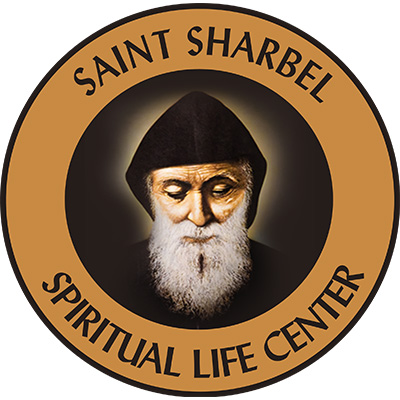
Saint Sharbel Spiritual Life Center | Eparchy of St. Maron
A spiritual center in Pittsburgh cultivates deeper devotion
Thousands of miraculous healings have been attributed to intercessions by St. Sharbel Makhlouf, a Lebanese-born Maronite Catholic priest who lived from 1828 to 1898. He is the patron saint of those who suffer in body and soul. Catholic Extension Society works with many people suffering in this way through our work with the marginalized on the peripheries of our country. We strive to uplift the poor and suffering by building up vibrant and transformative Catholic faith communities, where people can feel a sense of hope and joy through the presence of the Church.
Today, St. Sharbel’s legacy is being further recognized through Pittsburgh’s Saint Sharbel Spiritual Life Center. The center’s mission is to cultivate a deeper devotion to Christ in the Holy Eucharist through the example and intercession of St. Sharbel.
-
Read more
Part of the Eparchy of Saint Maron of Brooklyn, the center, which was renamed in honor of St. Sharbel in 2023, showcases Catholic teachings from both the Eastern and Western rites. Catholic Extension Society has actively supported the Eparchy of Saint Maron of Brooklyn throughout the last decade. This includes Catholic missions named after St. Sharbel scattered across the country, from Milwaukee down to Tennessee and El Paso, and out west to Las Vegas.
Mass is celebrated at the center Monday through Friday by a rotation of priests from traditions that include Maronite, Byzantine and Latin Catholic. In addition to the variety of Masses, the center contains more than 10,000 books on spirituality to further advance evangelization.
A healing Mass in honor of St. Sharbel is held on the 22nd of each month. These services include special prayers to God and St. Sharbel.
The evangelization potential at the Saint Sharbel Spiritual Life Center is monumental, and the center serves as a place where everyone can grow in knowledge and faith.
“The Saint Sharbel Spiritual Life Center will continue spiritual formation with a distinct Maronite Catholic flavor, combining the best of Eastern and Western Catholic traditions on the interior life,” said Bishop Gregory John Mansour.
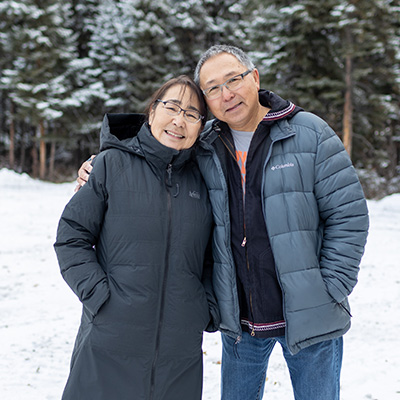
Dominic and Malora Hunt | Diocese of Fairbanks, Alaska
Yup’ik couple encourage and train Native faith leaders across 60,000 square miles
Dominic “Dom” and Malora “Lala” Hunt head the Native Ministry Training Program (NMTP) in the Diocese of Fairbanks, Alaska. The program was established in the 1990s by Native Catholics, for Native Catholics. The purpose of the program, which serves 5,500 people and is supported by Catholic Extension Society, is to train deacons and lay leaders to run the diocese’s parishes, which do not have resident pastors or staff.
The Diocese of Fairbanks is the largest diocese in America, geographically. It has just 23 priests to serve 46 parishes, with just 10 of those priests assigned to all 24 village churches in the Yukon-Kuskokwim Delta region. This region has no roads, so priests must travel by boat, snowmobile or ATV.
Between priest visits, deacons and lay ministers perform all other duties to ensure parishes are operational, such as leading Communion services, maintaining sacramental and financial records, providing counseling to those in need and leading sacramental preparation and other ministries.
-
Read more
In 2020, at the height of the pandemic, the Hunts became the first Indigenous co-directors of the NMTP. Just a year after signing on to lead NMTP, Dom was ordained a permanent deacon.
The Hunts provide comprehensive training to parish staff and volunteers, including liturgical and pastoral training. Rural parishes always struggled to maintain catechists due to Alaska Natives’ respect for elder wisdom, which limits those the community will recommend for leadership positions. The Hunts have addressed this issue creatively, by shifting catechesis from the parish to parents and guardians and developing culturally affirming catechetical materials.
“Yup’ik people are very humble, and they often insist they wouldn’t do a good job teaching the faith,” Lala said. “By having them teach their own kids, it opens up the possibility that they would be willing to teach the faith to others too.”
The Hunts have been instrumental in helping the diocese’s other faith leaders—who are not Indigenous—make significant advances in enculturation. As members of the Intercultural Dialogue Group and directors of NMTP, they have worked to ensure the diocese’s programs, materials and even liturgies reflect Indigenous values and traditions. For example, they have drafted rosary reflections rooted in traditional subsistence (i.e., hunting and gathering)—activities that would be familiar to Yup’ik families.
“Our work is meaningful because we know we are helping our people to reclaim their sense of the sacred. We are so proud to be Yup’ik Catholics, and we want them to be proud too. Embrace who you are! Our people have an innate spiritual connection to Creation,” said Dom and Lala.
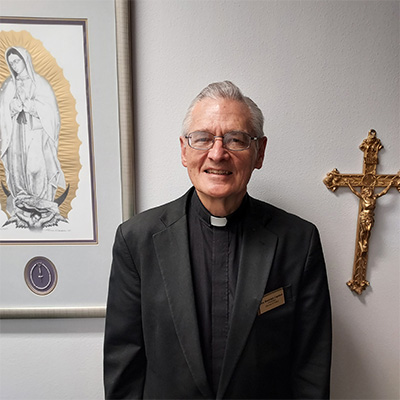
Deacon Randolph Copeland | Diocese of Gallup, New Mexico/Arizona
This deacon’s job description is as big as the 55,000 square miles he serves
To say that Deacon Randolph Copeland wears many hats would be a world-class understatement. It would take 100 milliners to supply all the hats he is called to wear.
Deacon Copeland serves in the Diocese of Gallup, New Mexico. Gallup is big. It covers 55,000 square miles, two states and two time zones, and Deacon Copeland is chancellor of every square inch.
Gallup has many challenges. Twenty-five percent of its population lives at or below the poverty line. Its per capita income is half that of the nation’s. Seventy-four percent of its population is Native American, most of whom face enormous health and economic challenges. And as is the case far too often, with poverty comes crime. Gallup’s crime rate is 173% of the national average.
It is in the heart of such challenging circumstances that the Catholic church is at its best. And it is Deacon Copeland who personifies the church’s mission.
-
Read more
Deacon Copeland’s duties as chancellor include personnel and property management. This is no small task. There are 72 parishes and missions and three dozen priests in his portfolio. Deacon Copeland also coordinates mission outreach for solicitation of funds and coordination of special projects as directed by Bishop James Wall.
Deacon Copeland may also be called upon to help with more mundane matters like fixing a roof that caved in on a parish church due to monsoons. Or fixing a leak in Bishop Wall’s office! Or something as simple as a trip to the grocery store to purchase food for a person in need. Deacon Copeland’s job description is never ending.
And how does Deacon Copeland manage so many things so well? The answer can be found in a quote from St. Therese of Lisieux he has pinned to his office wall. “Let us humbly take our place with the imperfect.” He is lifted up and energized by God who always stands with those who have been counted out.
When he retired in 2001, he and his wife moved to Gallup to work in the Orthopedic Surgery Department at Gallup Indian Medical Center, which is dedicated to the service of Native American peoples of that region with a special focus on children.
It is the children who are Deacon Copeland’s North Star. He and his wife are deeply involved in local pro-life efforts to support young families and mothers in crisis pregnancies.
Those who know him best say that Deacon Copeland always helps individuals in need. He does this as a matter of habit. The bishop himself says that this “is most inspiring and very true. In Deacon’s life he does much that is seen but also unseen.”
The truth is that Deacon Copeland serves the distressed, no matter who they are and in whatever capacity they need.
And that, perhaps, is the best job description of a deacon—“he serves the distressed, no matter who they are, and in whatever capacity they need.” You don’t need 100 hats to do that. Just the spirit of God who always stands with those who have been counted out.
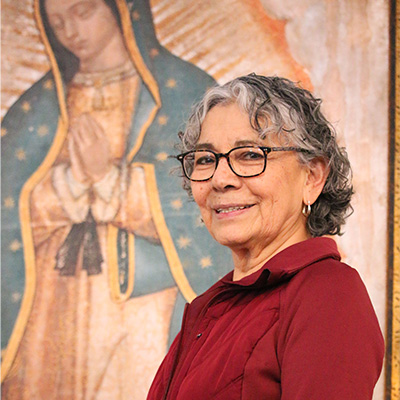
Silvia Cortes-Lopez | Diocese of Gaylord, Michigan
She feeds the faith of the workers setting our tables
It is an easy thing to overlook the sweat and toil that brings food to our tables.
Silvia Cortes-Lopez knows this. It is a long way from her birthplace in Jalisco, Mexico, to her ministry in the Diocese of Gaylord, Michigan. To be exact, 2,341 miles. This long journey helps her understand in a personal way the needs of migrant workers who bring food to our tables.
There are between 13,000 and 15,000 skilled laborers and their families who come to support the agricultural industry in Michigan. Many live in one of the 118 migrant camps in the region. The majority of these workers are Catholic with strong ties to their faith. Cortes-Lopez and her team work with these families to make sure that leaving home does not mean leaving their faith.
-
Read more
Cortes-Lopez’s responsibilities include teaching religious education; planning annual events and outreach visits primarily in the heavily migrant-populated counties; and implementing special programs for migrants during harvest season.
Cortes-Lopez said, “The community is my great family where I find support and great challenges leading me to greater commitment and desire to prepare myself to give better service. The catechesis and prayer of the Holy Rosary in different homes contributes to the family feel, and Spanish Masses gather us as one great family of God, in which there is no distinction of race, language or culture, all united in one faith.”
Her contact with the children and families through sacramental preparation and other outreach is intimate. She absolutely loves to do home visits. While these often include some aspect of catechesis, the real purpose is to build and nurture friendships with the families. She often helps with babysitting or short-term childcare when the need arises. Catechesis comes in many forms.
Cortes-Lopez focuses on building friendships and, as a result, is trusted by many. People often seek her counsel when experiencing personal problems, family difficulties and the heartache which comes with being far from home.
“I have seen the spiritual need of these people,” she said. “I have the deep desire that they have a personal encounter with God that would change their lives. I find great joy and feel this is my mission.”
Cortes-Lopez plays a pivotal role in building faith, inspiring hope and igniting positive change. Her leadership strengthens the bonds within the Hispanic community and creates a lasting impact on the lives of countless individuals.
Although most of us have no idea about the sweat and toil that brings food to our tables, Cortes-Lopez does. She knows that behind every bag of apples and every box of cherries there is a migrant worker, thousands of miles from home, doing this hard labor for the benefit of their family. And these workers deserve the best care and support our church has to give. After all, they are part of the great Catholic community of faith, and Sylvia Cortes-Lopez is their pastor.
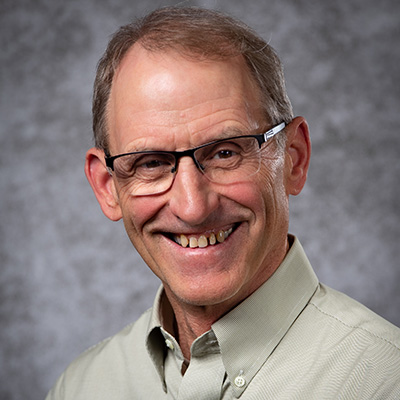
Mike Kube | Diocese of Grand Island, Nebraska
Civil engineer builds strong movement for life
Isaiah 35 proclaims that “the desert and the parched land will be glad; the wilderness will rejoice and blossom.”
Mike Kube is a retired civil engineer. He knows about getting water to where it is needed the most. He worked on Nebraska’s Calamus Dam and specialized in irrigation canals, pipelines and water-distribution systems. So, he and Isaiah would have had a lot in common.
And on a spiritual level, they would beat with the same heart.
Kube has been the director of the Pro-Life Office for the Diocese of Grand Island, Nebraska, since 2018 when he came on as a full-time volunteer. And since then, he has used his talent for engineering to build a pro-life movement that is bringing hope to parched places.
-
Read more
In Kube’s words, “Life is the preeminent issue of today.” And Kube gives his all to this effort.
Kube has built up the pro-life “infrastructure” in Grand Island. He has put together pro-life networks, organizations and pregnancy-help groups. And he has promoted pro-life advocacy on legislative issues by hosting an annual pro-life coffee meeting with Nebraska senators.
Most impressive is his work with young people. Kube brought speakers into local high schools annually to speak on and promote a pro-life culture. He facilitated the organization of Students for Life groups within high schools and co-sponsored high school students to attend the national March for Life each year in Washington, D.C.
As a result of these efforts, two high school students started a pro-life group after attending one of the pro-life coffee meetings, and they have continued pro-life advocacy in college.
Additionally, Kube organizes and assists with processions, Masses and eucharistic adoration for the pro-life cause because he believes that this work is guided by God’s Spirit, the first and foremost engineer.
Kathleen Hahn, retired chancellor of Grand Island, said, “Mike Kube is an outstanding mentor and leader in the diocesan pro-life movement. He actively finds ways to incorporate all parishes in life-giving and affirming manners. Whether it’s Walking with Moms in Need, Pro-life Art Contests, speaking opportunities, workshops, lobbying in the legislature or hosting our diocesan-area legislators and governor for an annual coffee morning, Mike gives his all. He is a powerhouse in the movement.”
When it comes to Kube’s work for the pro-life movement, there are no half measures. There is much parched land in need of God’s life-giving grace, and like Isaiah, Kube will not rest until the land will be glad and the wilderness will rejoice and blossom.
Because, as he says, “Life is the preeminent issue of today.”
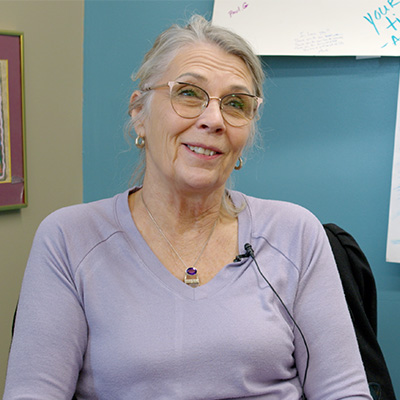
Theresa Ortega | Diocese of Helena, Montana
Thrift store manager creatively confronts realities of poverty
When is a thrift store not a thrift store? It is not a thrift store when Theresa Ortega manages it.
When it comes to Ortega’s ministry, one thing always leads to another. As St. Thomas Aquinas wrote, “Goodness gives itself away.” There is always more to do. This phrase should be on Ortega’s business card because it describes her fundamental orientation.
Ortega was initially hired to oversee a thrift store aimed at providing affordable goods to the community while offering needed employment and skills-building opportunities to staff. Staff members were often individuals who would otherwise be rejected when applying for work due to their personal history, lack of work experience or disability. Given their backgrounds, it would be hard to find a more empathetic staff.
But there was more to do. The needs of thrift store patrons inspired Ortega to start a crisis-assistance ministry to support the impoverished and marginalized members of the community.
-
Read more
Located in the thrift store and in collaboration with over 20 local organizations, 25 churches and a base of faithful donors, the assistance ministry meets a broad swath of critical needs for clients. Relief comes in the form of necessities found in the thrift store and in more comprehensive support such as medical assistance, food, housing, transportation, mental health services, tax relief and assistance with utilities.
But there was still more to do. Ortega then became involved with Our Place drop-in center in downtown Helena. In 2020, due to Ortega’s compassion and commitment to serving the most vulnerable, Our Place temporarily became an outreach of Good Samaritan Ministries, the thrift store she operates. Now officially a permanent program under Good Samaritan, Our Place provides a safe, inclusive and nonjudgmental environment for individuals experiencing homelessness or seeking support with sobriety and mental health challenges.
Ortega actively engages with clients at Our Place, offering assistance in obtaining essential documents such as Social Security cards or birth certificates. She also assists them in securing housing and connecting them with addiction or other necessary services in the area.
One of Ortega’s volunteers said this about her ministry: “The depth of Theresa’s impact on our community is profound, literally changing and even saving lives. While she could have simply operated a thrift store and turned a blind eye to the myriad needs around her, she instead chose to confront the indifference and neglect facing the less fortunate head-on. Her steadfast determination has left an indelible mark on our community. Because of her efforts, Christ is more present and moving in our lives.”
So, a thrift store is not a thrift store when Theresa Ortega is managing it. It is a launching pad, the setting for goodness giving itself away in ever-widening arcs.
But don’t tell Ortega that. You won’t find her. She’s out finding still more to do.
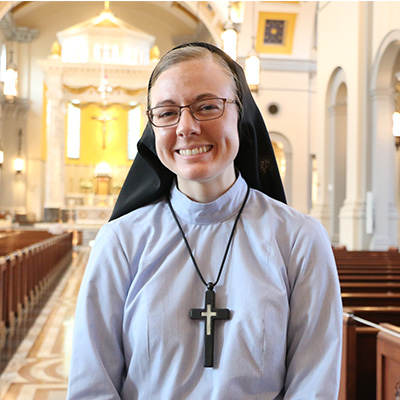
Sister Mary Lisa Renfer, RSM, DO | Diocese of Knoxville, Tennessee
Meet the Catholic nun and doctor behind the wheel of a 40-foot mobile medical clinic
What does it mean to say that we behold the face of Our Lord in the poor?
It is not a memory of some picture. It is not a product of our imagination. To see the face of Our Lord in the poor is to experience a dynamic connection, a Spirit-filled activism to which we must give our all.
Sister Mary Lisa Renfer learned the lessons of the Spirit early. She was one of seven children growing up in Detroit. After her sophomore year in college, while attending a mission trip in Ecuador where she encountered abused children, she responded to the call to join the Sisters of Mercy (RSM, DO), choosing mercy as both her religious profession and the habit of her heart.
-
Read more
The order sent Sister Mary Lisa to Michigan State University, where she completed her doctorate degree in osteopathic medicine. This unique fusion of a medical degree and a religious vocation prepared Sister Mary Lisa to become the medical director of St. Mary’s Legacy Clinic (SMLC).
The first indication that one is beholding something special in Sister Mary Lisa’s ministry is her clinic’s sign, which reads: “Extending the Healing Ministry of Jesus to East Tennessee.”
The sign is on the side of a 40-foot-long, three-axle, 10-wheel, custom-made, diesel-run doctor’s office, complete with on-board computers, a treatment room, a health assessment station and a lab.
Her patients come from the peripheries to the mobile clinic. Seventy-two percent of them live in extreme poverty, and they suffer the afflictions of the poor—diabetes, high blood pressure, liver disease, opioid addiction and lung disease.
The vast majority of the patients are not Catholic. In fact, often, their first exposure to the Catholic Church is Sister Mary Lisa, her staff of two and her team of 100 volunteers. There could be no better introduction to the Church.
The clinic covers a lot of ground. SMLC has nine practice sites (soon to be 10) and will see over 1,500 patients this year alone. The mobile clinic traveled over 11,000 miles last year. And, as always, it is the people who matter.
Pope Francis said, “Even when healing is not possible, care can always be given.” Sister Mary Lisa exemplifies this by walking with each patient through each of their unique circumstances. She never separates the healing of the body from the ministry to the soul. She said, “Jesus comes to meet you in each person. Sometimes I can’t fix them, but I have to walk with them. And the more you walk with them, the more you know how to help.”
Sister Mary Lisa Renfer sees the face of Our Lord in the poor. It is her habit. Her ministry is a Spirit-filled activism to which she gives her all. Our Catholic faith comes alive when we stand in solidarity with those who suffer, and Sister Mary Lisa shows us the way.
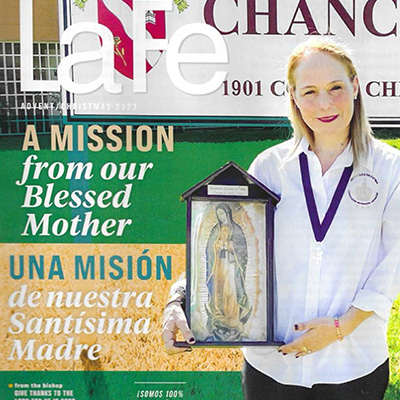
Ivonne Aguirre | Diocese of Laredo, Texas
How the Blessed Mother lit a path for woman to spark growing movement of prayer
Inspirational discontent.
This is one of the ways God speaks to our hearts. We don’t always think that our discontentment or restlessness can be the very touch of God, but it can be. Just ask Ivonne Aguirre from St. Patrick’s Parish in Laredo, Texas.
In 2018, while praying at Mass, Aguirre felt a strong calling to serve beyond her parish. She and her husband, Martin, were very involved at St. Patrick’s, but Aguirre thought she could do more.
Feeling a restlessness in her soul, she asked the Blessed Mother to light her way. She knew there was something more she could do for Mary. Aguirre asked her pastor, Father Anthony Mendoza, what this “more” for the Blessed Mother could be. Father Mendoza encouraged her to form a ministry named after Our Lady of Fatima, and that is how Apóstoles de Fátima came to Laredo.
-
Read more
Every week after Sunday’s Mass, one family from each of the parishes in the Diocese of Laredo is assigned a missionary retablo to take home. A retablo is a small shrine bearing an image of Our Lady. Each family then commits to daily prayer and meditation for Pope Francis and the Church as a whole, for families, for the governments of each nation and for peace in the world.
Approximately 300 missionary retablos have been distributed. Aguirre came to understand that her mission was to “wrap the entire diocese with the veil of Our Lady.”
Additionally, Apóstoles de Fátima is in the process of establishing two more initiatives. Firm Rock is a three-year program to help newlyweds establish their marriage on the “Rock” who is Christ. The second initiative, The Armor of God, is a club for children that meets monthly with the goal of encouraging youth to continue growing in their faith after receiving their first holy Communion and prior to being confirmed. The club also prioritizes having a missionary spirit and imitating Jesus in love and humility through the practice of the corporal and spiritual works of mercy.
Aguirre said, “The fruits that have been borne from Apóstoles de Fátima have been abundant.” She humbly recognizes that our Blessed Mother placed every inspiration in her heart, and that it is through the grace of the Holy Spirit that so many hearts have been moved to prayer and worship and have seen lives transformed by God’s mercy.
Led by our Blessed Mother, Aguirre plans to share the work of Apóstoles de Fátima with other dioceses in hopes that they too may be open to new ways of building the Kingdom of our Lord.
After all, there are so many people who experience restlessness in their faith life. Aguirre and the Apóstoles de Fátima will help them see that their discontentment can be the first step toward the Blessed Mother placing inspiration in their hearts.
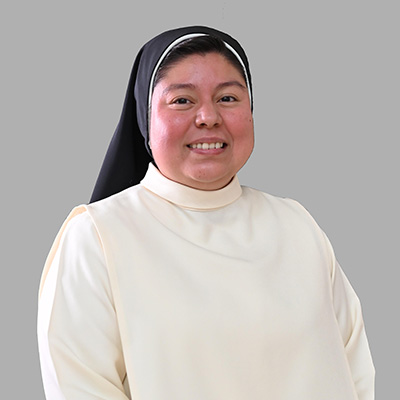
Sr. Gloria Gutierrez, OP | Diocese of Las Cruces, New Mexico
Nun instills faith and love among children in US borderland
Sister Gloria Gutierrez looks straight at things from which most of us would turn away. Like extreme poverty. Most of us avert our gaze, feeling embarrassed, helpless, even fearful. But not Sister Gloria. She knows that in an encounter with poverty, we can discover God’s thirst. And we can discover how our powerful thirst is God’s very own.
It was on a Holy Week mission in Mexicali, Mexico, that Gloria Gutierrez encountered what she described as “poverty at its maximum.” She was 21 years old and earning her university degree, but she felt that something was missing. She was spiritually thirsty.
When she saw the dilapidated, ramshackle houses made of cardboard and talked to the children who explained that they ate what measly scraps there were at 2:00 p.m. so they wouldn’t be too hungry when they went to sleep, it was then she felt God’s thirst.
-
Read more
God thirsts to love the poor, the imprisoned, the hungry, the heartbroken and the abandoned. In Mexicali, Gloria Gutierrez discovered her vocation, a way to slake the thirst of her soul, a way to make God’s thirst her own.
Gloria joined the Dominican Sisters of the Christian Doctrine in July 2014, and ever since she has served as an instrument of God’s love.
She spent two years in Ciudad Juárez helping with day care, preschool and religious education, followed by four years serving the poor in three separate locations driving a weekly circuit of 146 miles.
She was then asked to come to the Immaculate Heart of Mary Cathedral Parish (IHMC) in Las Cruces, New Mexico, to reach out to youth and young adults. Her weekly round trip was a measly 80 miles, leaving more time to expand her outreach.
She was then asked by the mother superior of the Dominicans and Las Cruces Bishop Peter Baldacchino to work with the migrants in the Otero County Processing Center (OCPC). There she discovered that the fundamental human principle of family unity, long a hallmark of U.S. immigration policy, was under attack.
Children were separated from their parents, husbands and wives from each other. Sister Gloria was there for them, a comforting presence, a source of solace and prayer, a teacher of the faith and bearer of the Eucharist.
Today, Sister Gloria directs the IHMC sacramental preparation program for Communion and confirmation. Sacramental preparation has grown to 132 students, as well as nine adults participating in the RCIA program. She continues to minister to 50 migrants at the OCPC.
And through it all, no matter how diverse Sister Gloria’s ministry is and will be, one thing remains the same—God’s thirst is her thirst.
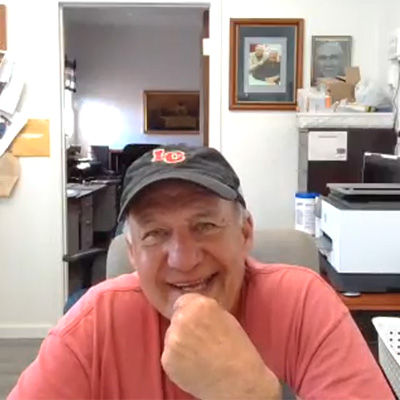
Eddie Michael | Diocese of Lexington, Kentucky
Lifelong leader in Appalachia repairs homes and hearts
St. Joseph would have loved Eddie Michael. Both are carpenters. They know their way around a plane and a lathe. But more than that, they know how to build hope. Their carpentry is merely the setting for rebuilding hearts.
Eddie Michael is a lifelong resident of Louisa, Kentucky, a city in eastern Kentucky where the Father Beiting Appalachian Mission Center (FBAMC) is located. The center is an outreach ministry of the Diocese of Lexington that welcomes volunteer groups from around the US who donate thousands of hours conducting home repairs in Appalachia.
-
Read more
Things are tough in eastern Kentucky. The area has recently seen a decline in population. Over 20% of its population is below the poverty line, and almost 17% has not yet graduated from high school.
Michael knows this area well. He served as a football coach, teacher and superintendent for Lawrence County before retiring in 2003. Coaching runs in Michael’s blood. Both his son and son-in-law coached in the NFL. This explains why Michael is such a great coach to FBAMC clients looking to improve their homes.
There is little that Michael and the FBAMC volunteers do not do. As executive director, Michael leads an average of 200 home visits each year. A home visit assesses the social service needs of the family as well as the condition of their home. The Home Repair Program offered by FBAMC completes an average of 50 home repair projects annually, with projects ranging from handicap-accessible ramp installments to roofing repairs.
Michael’s clients have many other needs besides home repair. Some FBAMC efforts have included providing transportation to homeless shelters, buying a tank of gasoline to assist a family who must drive every day for cancer treatments, or helping a senior citizen complete the application paperwork to become a resident in low-income housing when their home is beyond repair.
One woman’s life was transformed by her encounter with FBAMC. She was a single mother who needed a handicap ramp installed on her trailer. Michael and some volunteers spent five days getting to know her while the installation and repairs were being completed. She said her goal was to attend phlebotomy school but didn’t know if it was possible or where to start. Michael helped her explore potential options for the remainder of the week.
A few months later Michael went to do a follow-up visit. When he arrived, he noticed that the ramp had been painted and decorated. The woman said that the ramp was such a gift that she wanted to take care of it as best as she could. She also told Michael that she had enrolled in phlebotomy school and was working to make a better life for her child.
More than nails, drywall and bricks, it is hope that is the one essential material for building a life. St. Joseph knew this. Michael knows this too. That is why he is a Lumen Christi Award nominee.
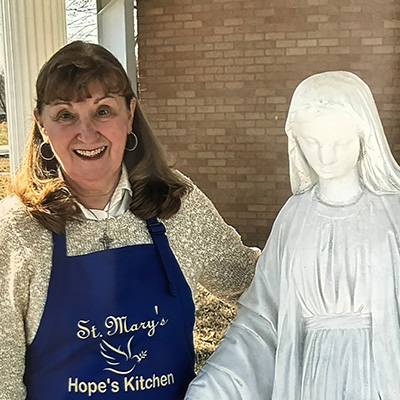
Marie Rollins | Diocese of Little Rock, Arkansas
A woman’s mission to feed body and soul spreads goodness through small Arkansas town
St. Thomas Aquinas was fond of saying, “Bonum Diffusivum Sui Est,” or “Goodness always tends to spread.” Marie Rollins would know exactly what St. Thomas was talking about. Rollins is the founder of HOPE’s Kitchen (Help Other People Enjoy) in Siloam Springs, Arkansas. She and a band of dedicated volunteers from St. Mary’s Church have been spreading goodness to thousands over the past 11 years.
HOPE’s Kitchen is a place where a team of approximately 20 volunteers come together each month to provide a safe place where everyone feels welcome and people can share a free meal. HOPE’s Kitchen served its first meal on March 29, 2013—Good Friday, a perfect day to serve those suffering from hunger. Since then, Rollins and her team have served over 33,000 meals.
-
Read more
At the beginning Rollins thought HOPE’s Kitchen would just serve meals, but since goodness always tends to spread, the mission grew. Those coming for meals asked Rollins and her volunteers for their prayers. What started as nutrition for the body became food for the soul—for both the volunteers and the patrons.
Rollins quickly realized that many people could not make the trip to St Mary’s. So HOPE’s Kitchen had to go to them. Volunteers were soon delivering meals to friends and neighbors who were homebound or elderly. Goodness spread.
Several donors came forward to update the parish kitchen. High school and college students volunteered, finding HOPE’s Kitchen a perfect way for them to connect to church and find a place in the Gospel’s age-old mandate to feed the hungry.
One impact was not foreseen at the start of the ministry but has become a vital part of the service—the provision of basic needs. At each meal service, patrons are provided with requested services in the areas of food, clothing, persona-care items and referrals to community resources. The whole Siloam Springs community pitches in and finds what is needed.
Rollins came to understand HOPE’s Kitchen’s work as creating a space for the Holy Spirit to move. She believes the Holy Spirit inspires volunteers to make meals and inspires patrons to seek out those meals, plus the love and care that come with that. Goodness spreads. In fact, the work of the Holy Spirit can be thought of as spreading goodness.
Rollins stated simply that HOPE’s Kitchen’s work is reflective of Mother Teresa’s quote, “Do something beautiful for God.” So on the third Thursday of the month, volunteers come together to prepare for the next day’s meal. And they return on Friday to serve those meals to the homeless, to veterans suffering from PTSD, to the elderly, the disabled, the poor, those down on their luck and those who are counted out. It is beautiful.
Or, as St. Thomas would say, “Bonum Diffusivum Sui Est.”
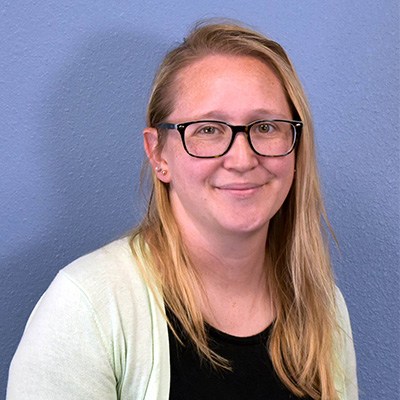
Peggy Klein | Diocese of Lubbock, Texas
Youth minister draws on pop culture to exponentially increase teen involvement in church
“Lord, what will become of me?”
Is that a quote from i) a saint, ii) Scripture, or iii) Taylor Swift?
Welcome to the creative, engaging and effervescent mind of Peggy Klein.
Klein is the director of the Office of Youth, Young Adults and Campus Ministry for the Diocese of Lubbock. She works with middle school and high school students, college students, young families, single parents, widows, and single adults discerning their vocations. This is easily the most unique and diverse group out of all the ministries in the Diocese of Lubbock.
Serving in a sprawling diocese, Klein communicates with many young people through various forms of social media, such as Facebook Messenger, Instagram, X (formerly known as Twitter) and Flocknote. This work has grown the online reach of not only her ministry but the whole diocese. New times need new approaches.
-
Read more
Klein came to this ministry in 2021 after many previous directors had come and gone. She started from scratch. While most people would struggle, Klein saw this “blank slate” as a chance to propel Lubbock’s Bishop Robert Coerver’s vision for the youth laid out in his pastoral letter.
As pandemic restrictions lifted, she set out to meet with every pastor, youth minster, teacher, student and young adult in every parish who would receive her to listen to their needs, inspire them to develop dynamic youth programs at the parish level and invite them to participate in diocesan events.
It turns out that the secret to engaging youth is to listen to them. She created programs to help young people encounter Christ through service, education, mentorship and spiritual direction.
She has taken groups of students to the National Catholic Youth Conference (NCYC) to experience the Universal Church through prayer, community, evangelization, and catechesis. In 2022, only eight teens signed up, but by 2023 word had spread about the NCYC, and more than 50 youth and 10 adult sponsors participated.
Klein has created a Local World Youth Day (LWYD), a much-loved annual gathering of youth on the Feast of Christ the King.
Klein’s first LWYD held in Lubbock in 2021 had a small turnout of sixty children. In 2023 an estimated 500 people joined the Local World Youth Day celebration.
When Bishop Coerver was asked how he felt to see a sea of 500 people, mainly youths, attend, he said, “It was amazing to be leading that procession with the Eucharist and hearing the praying and the singing that accompanied the procession. The spirit of the youth was palpable.”
At a time when local parishes struggle to involve young people, youth ministry in Lubbock is flourishing. And the creative, engaging and effervescent mind of Peggy Klein and her young people are leading the way.
As for the opening pop quiz, the answer is, iv) All of the above.
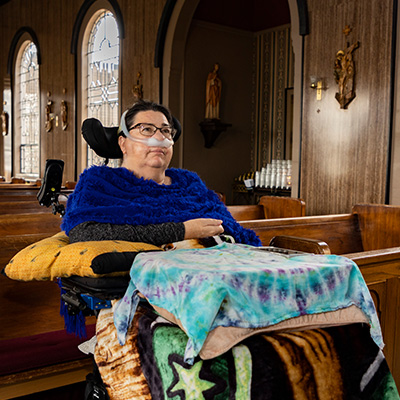
Sarah Alley | Diocese of Memphis, Tennessee
How a former athlete with ALS turned her anger into love
Don’t define Sarah Alley by her disability.
Alley was an athlete her whole life. At six feet tall, she was a college basketball player, a basketball and volleyball coach and an avid runner. Alley taught middle and elementary school for 20 years until 2015. It was then that she was diagnosed with ALS.
ALS is a disease of the nervous system that weakens muscles and impacts mobility. There is no cure for the disease. Several months after her diagnosis, Alley says she was angry and bitter at God for having the disease. “I was physical all my life, and here I was on crutches at the time trying to walk across a soccer field.”
-
Read more
Alley had always been deeply involved with her parish, Holy Angels Catholic Church in Dyersburg, Tennessee. She read at Mass, served as an Extraordinary Minister of the Eucharist, and served as director of Religious Education for five years.
But ALS took all that away. She was confused, angry and becoming bitter.
A friend encouraged her to “have it out with God.” Alley went home, got in her closet and yelled at God for all the unfairness. She asked, “What is happening to me?”
Alley said that God answered her back right away. He said, “Sarah, you are much more than your body.”
And that is when Alley discovered her special ability, an ability forged by embracing her adversity and grounded in the enabling Spirit of God. Currently she is unable to use her hands to type due to her illness, but she uses her eyes to create the words to blog about her experience with ALS and her journey to spread God’s love to others.
She began blogging about her experience with ALS and living out her Catholic faith. The Dyersburg State Gazette was so inspired by her blog that the newspaper began publishing it on its news website and still does to this day.
In 2016, she became race director for “Autumn Walk for ALS,” an annual walk/5k/10k run for education and ALS research. Alley also works with Matthew 25:40, a local outreach ministry that assists in feeding 700 people per month. She also runs three separate weekly Bible studies with people from different Christian denominations.
Alley says “I want to spread so much love and light. I can be a saint because the more you give God’s love, the more He gives you.”
Currently, she is writing a book titled My Life Has Been Resurrected, which is about ALS and her faith journey. “As long as I’m living,” she says, “I will use my brain to help others in need. I want God to use me until there is nothing left.”
Disability? Hardly. One would be hard-pressed to find a more abled person. But that is what happens when we give our lives over to God and use all we have until there is nothing left.
And Sarah Alley is our example, our Patron Saint of Ability. A true Lumen Christi.
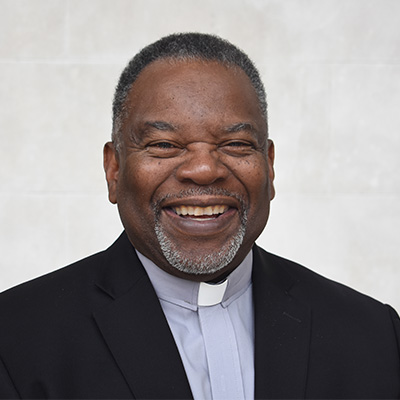
Deacon Ronnie Hathorne | Archdiocese of Mobile, Alabama
Alabama deacon does it all to display God’s love across decades
The sixth chapter of the Acts of the Apostles describes the founding of the first deacons. There were seven in all, charged with serving the needs of the fast-growing Christian community.
Deacon Ronnie Hathorne would have fit right in. In fact, were he one of the original seven, they may have needed only him. It is not an understatement to say that Deacon Hathorne covers a lot of ground!
His history of service is stunning. Deacon Hathorne was ordained on June 15, 2002. He was assigned to St. Joseph Parish, Maysville, where he is now involved with many parish ministries.
-
Read more
He has served as a member of the Catholic Social Services Board of Directors and as pastoral administrator for the Permanent Diaconate of the Archdiocese of Mobile. He was appointed by Archbishop Thomas Rodi as chancellor, wherein he served in a dual role as chancellor and director of the Permanent Diaconate.
During his 10 years as director, 27 men were ordained to the Permanent Diaconate. In August of 2023, Deacon Hathorne took on development, oversight and direct supervision of the Archdiocese of Mobile’s first Hispanic Formation Program.
So, if you are keeping score, Deacon Hathorne is successfully managing and overseeing both a Hispanic and an English-speaking Formation Program, directing the Permanent Diaconate, and carrying out his parish assignment at St. Joseph Catholic Church.
As the old saying goes, if you want to get something done, ask a busy person.
Deacon Hathorne’s ministry is not just an impressive listing of job responsibilities. It is a reflection of his heart. He burns with the Light of Christ and inspires all he encounters to allow that same Light of Christ to burn within their hearts, allowing them to display God’s love to His people in unique and essential ways.
So yes, Deacon Hathorne is a busy man. (His list of job responsibilities is 19 items long!) But more fundamentally, he is in love with the people of God in the Archdiocese of Mobile and thanks God every day for the opportunity to serve them.
And if St. Paul ever wants to start up another round of deacons, he will not need seven candidates. He will need only one—Deacon Ronnie Hathorne.
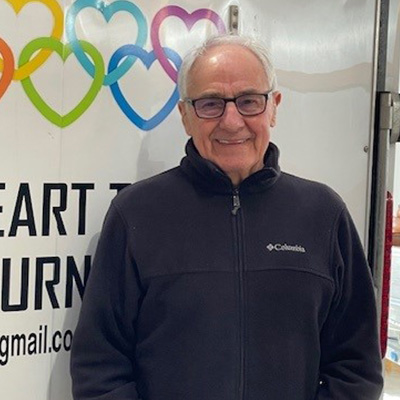
Steve Gehrke | Diocese of New Ulm, Minnesota
Minnesota retiree furnishes homes for struggling families
Gerard Manley Hopkins wrote, “Christ plays in ten thousand places.” Steve Gehrke would completely agree with this sentiment.
While watching an episode of MASH, Gehrke was struck by a line the character Chaplain Father Mulcahy uses in a homily: “We’re not put here for a pat on the back. God has put us here so that He could be here Himself, through the people He created in his image.”
Gehrke thought he had retired. But Father Mulcahy’s words inspired him to take on a new job.
Gehrke recognized a need in the local community to provide basic home furnishings and household items for struggling families.
-
Read more
He and his good friend, Dick Embacher, began collecting used, good-quality furniture and beds. Some furniture was donated, and other furniture was purchased at garage sales.
Local furniture stores chipped in with donations. As word got out, referrals began coming from Brown County Human Services and other local organizations. As the demand increased, Gehrke and Embacher outgrew the garage they were using. They rented a larger storage facility and formed Heart to Home Furnishings.
Heart to Home Furnishing has been operating for over 10 years and currently has more than 40 volunteers who schedule pickups and deliveries. Volunteers also clean and recycle pillows and bedding for mattresses. They currently receive referrals from many local agencies including Brown County Human Services, First Choice Pregnancy Services, NOVA House (a halfway house for the mentally ill), NUMAS Haus (a homeless shelter for women and children), Veterans Services, Red Cross and Minnesota Valley Action Council, as well as local churches.
From the very beginning Gehrke has used his truck and trailer to pick up and deliver items. He did this with no intention of ever requesting or accepting reimbursement for expenses, or maintenance for fuel. Gehrke has logged roughly 15,000 miles in his faithful truck, and even today, he will not accept reimbursement for purchases he makes for Heart to Home.
As if Heart to Home weren’t enough, Gehrke also maintains New Ulm’s beautiful outdoor Stations of the Cross. Additionally, Gehrke has personally cut, sanded and finished over 2,000 individual crosses so each person who visits the historic Way of the Cross can leave with a cross as a reminder of their visit and spiritual experience.
Dick Embacher said, “When watching Steve in action, interacting with and serving others, I often think of the song ‘They’ll Know We Are Christians by Our Love’ or the quote ‘See how those Christians love one another.’ It would surprise me if there is anyone whose life and work reflect Christ’s Light in the world any more brightly than Steve’s.”
Father Mulcahy would agree. God has certainly put Gehrke here so that “He could be here himself, through the people He created in His image.”
The simple truth of the matter is that Christ plays on ten thousand stages, and one of them is Steve Gehkre’s heart.
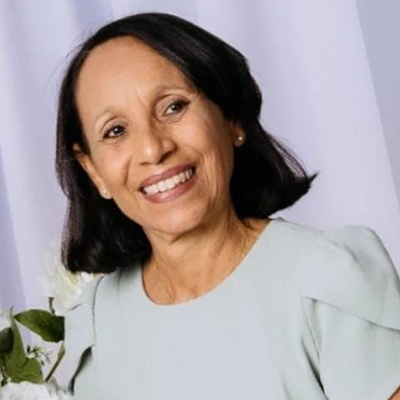
Maria S. Ortiz de Pedro | Diocese of Ponce, Puerto Rico
Puerto Rican woman helps community rise from devastation
The great poet Maya Angelou wrote, “You may encounter many defeats, but you must not be defeated. In fact, it may be necessary to encounter the defeats so you can know who you are, what you can rise from, and how you can still come out of it.”
Maria S. Ortiz de Pedro and the people of Ponce, Puerto Rico, would wholeheartedly agree. They know what a people can rise from. They know who they are.
In September 2017, Hurricane Maria lashed Puerto Rico, devasting the entire island. Maria S. Ortiz de Pedro, known affectionally as “Sokie,” and the people of her parish, St. Anthony of Padua, in Guayama, Puerto Rico, responded to this overwhelming disaster by starting an emergency relief hub, which became known as the Collection Center.
-
Read more
The Collection Center received and channeled the aid sent from the diocese, churches and private citizens outside of Puerto Rico. Guayama and the neighboring towns of Salinas, Arroyo, and Patillas were the immediate recipients of the emergency aid.
Hundreds of families came to the Collection Center looking for food, water, clothing and basic necessities. Most of the families had lost everything. Sokie and her volunteers worked 12 hours a day to keep up with the endless requests for help.
Sokie and the people of St. Anthony made it their mission to continue to provide immediate help without the endless protocols that so often slow down the distribution of aid. The Collection Center was renamed to The Mercy of Jesus because the community thought that Jesus was and would always be at the heart of their ministry.
Inspired by the Social Doctrine of the Church, Sokie prioritized the organization’s efforts to give aid to the most vulnerable. This was their singular evangelization strategy. The Mercy of Jesus lived up to its name. They wanted people to pay attention to what they did and not just to what they said.
The passage of time has yielded further refinements. Sokie has added a kitchen for hot meal service to the elderly and sick and their caregivers. She has added a washing machine and dryer to improve the quality of life for the homeless and for those who need clean clothing and bedding during their illnesses.
And Sokie has helped other communities that have faced disasters of their own. She has organized missions of help and support to the Bahamas after Hurricane Fiona, to western Puerto Rico after a 6.4 earthquake in 2020, and to all both near and far during the COVID-19 pandemic.
Sokie and the Puerto Rican people have dealt with hurricanes, earthquakes and other disasters. But they will not be defeated. They know who they are. The know that with and through the Mercy of Jesus, they can rise from anything.
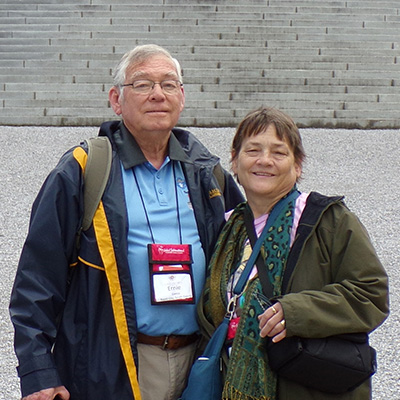
Ernie Garcia | Diocese of Rapid City, South Dakota
Twenty-year Air Force Vietnam vet extends compassion to the neglected
During his time serving our country in Vietnam, Ernie Garcia partnered with local Catholic parishes to serve in leper colonies during time off on the weekends. It was a life-changing experience for the El Paso, Texas, native, as it greatly impacted his thinking of how people should be treated. He developed strong bonds with these individuals, including a 13-year-old Vietnamese boy who viewed Garcia as an older brother. His time here taught him that no matter someone’s physical and social limitations, that everyone should be treated with human dignity.
The 20-year-U.S. Air Force Veteran eventually settled in Rapid City, South Dakota in the 1980s. Over the last four decades, he’s utilized his experiences serving the marginalized in Vietnam to extend compassion to the hungry, homeless, and disabled in Rapid City.
-
Read more
Garcia has been involved in the Knight of Columbus for nearly 30 years, including as Grand Knight from 2022-2023. He’s helped lead initiatives such as an annual turkey dinner to feed 800 people. In addition to this, he also routinely stops and assists the homeless on the streets by simply buying them a meal. He’s also helped run the Rapid City Knights’ Coats for Kids project, where as many as 300 winter coats are purchased and distributed to keep children in need warm.
In 2019 five Nigerian families came to Rapid City. Garcia was there to welcome them to the community and has walked with them on their American journey ever since. He’s helped them purchase necessities such as winter clothing. He’s even invited them into his and his wife’s home when their water pipes have frozen in the frigid South Dakota Winters. Just as he did in Vietnam, Garcia shows complete kindness to the stranger.
“Ernie shows us just how easy it is to be kind to our fellowman and to lend a helping hand when needed,” said James Schaefers, Director of Facilities for the Diocese of Rapid City. “His strong faith in our Church is an inspiration to all who know him and meet him each day.”
Beyond these ministries, Garcia is very passionate about helping those with disabilities. He and his wife currently host their 29-year-old goddaughter, who has Down Syndrome, so that she can have access to the services provided in Rapid City that aren’t available where her biological family lives. Each day, Garcia takes his goddaughter to Black Hills Works, a center that provides disabled people with social connections and activities that support their health and wellness.
Garcia is inspired by their unbelievable joy despite their circumstances. This is similar to the inspiration he drew working with the lepers in Vietnam. And this lifetime of experiences is why, each day, Garcia strives to and succeeds in treating everyone he encounters with compassion and dignity.
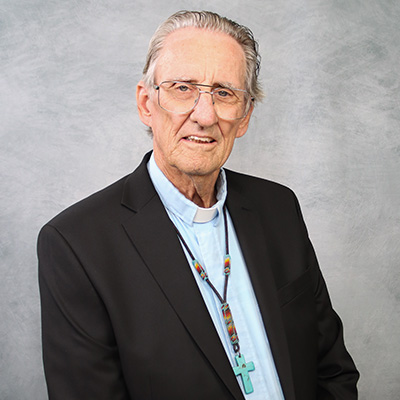
Father Earl Henley, MSC | Diocese of San Bernardino, California
Missionary priest walks with and learns from Native Americans in California
When most of us hit our 80s, we’re thinking about tee times, senior citizen buffets and how to close out our bucket list.
But not Father Earl Henley. He is thinking about how to strengthen the Native American community by bringing Catholic teaching and values while honoring and preserving Native traditions. And he drives hundreds and hundreds of miles every month to do this, spreading himself between six separate reservations.
As amazing as this is, it is not new behavior. Father Henley is a member of the Missionaries of the Sacred Heart. He is a missionary through and through. Right after his ordination, Father Henley went to Papa New Guinea where he served for 23 years. Next he went to the Youngstown, Ohio, Retreat and Renewal Center. And then in late 1990s, feeling the “tug of heart to be a missionary once again,” he went to the Diocese of San Bernardino in California to serve the Native American community. And he has been there ever since. In 2000, he became the Director of the Office of Native American Ministry.
-
Read more
Father Henley resides at the St. Joseph Soboba Indian Reservation and reaches out to other communities monthly. He does everything a busy priest would do. He leads the Eucharist and conducts baptisms, first reconciliations, first Communions, funerals and one-year anniversaries of those funerals.
He serves by offering a Catholic presence and encouraging the Native Americans to have dreams and continue to journey. Faith enables us to love tenderly, to believe and hope continuously. Faith is an adventure in trusting Him.
Father Henley is dedicated to helping the Native Americans to not feel invisible.
Nowhere is that dedication more present than in Father Henley’s work with those considering suicide and with families who have lost loved ones to suicide.
For Native communities, limited access to health care, chronic unemployment, poverty and historical trauma make suicide all too frequent. Father Henley said, “I would have given up years ago. You have to remember the Native American history. They went through a lot of turmoil in American history; their lands were taken away from them. They were told to cut their hair, not speak their language and learn English. When you lose your language, you lose your Spirituality.”
So, Father Henley is not thinking about a tee time. He is too busy walking with his people in faith, helping them speak the language of hope. He is 81 years young, and it’s as if his missionary work has just begun.
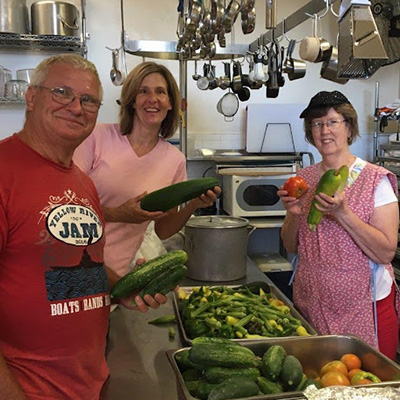
Sacred Heart Christian Service Center | Diocese of Savannah, Georgia
Christian center empowers those in need to become self-sufficient
Matthew 5:15-16 emphasizes the importance of our actions: “Let your light shine before others, so that they may see your good works and give glory to your Father in heaven.”
The Christian Service Center (CSC) in Warner Robins, Georgia, embodies such a light in the community. It was established in 1984 as an outreach initiative by Sacred Heart Parish to meet the needs of the disadvantaged. Today, its mission is to provide crisis-oriented assistance to families and individuals.
Each month, over 70 dedicated volunteers work tirelessly to bag food, organize clothing donations and assist during food and clothing distributions. Additionally, volunteers manage holiday drives, senior luncheons and soup kitchen services. CSC’s active community engagement played a pivotal role in contributing to the ongoing construction of a permanent homeless center.
-
Read more
CSC successfully operates out of a vision to build a healthy community by empowering those in need to become self-sufficient. Volunteer and former chairman of CSC’s Advisory Committee, Paul Travitsky, shared his full-circle experience of how he began giving back after receiving aid himself at CSC: “I’ve done all this out of gratitude for the help I received at the CSC. I figured if I needed help during a low time in my life, then there must be hundreds more out there that need help as well. I needed to help those who helped me.”
Another volunteer wrote, “I love the way we pray before opening our door each day and greet our clients. More importantly, I feel the Holy Spirit working through me every Wednesday at the Center, and I walk away very grateful for the Lord’s blessings in my life.”
The CSC’s contributions have been recognized with honors, including the key to the city of Warner Robins. CSC also received a Senior Hunger Mini-Grant to address food limitations among the elderly poor. As a result of surveying these seniors, food donations were adjusted to include healthier options, and CSC now partners with local growers. CSC is also becoming a Georgia Gateway partner to assist clients with SNAP and Medicaid benefits applications.
CSC anticipates serving 6,000 individuals in the coming year, continuing its legacy of shining the light of Christ to Warner Robins’ economically challenged neighbors.
CSC supporter Brian Wise reflected on how the center stands out as a beacon of hope and compassion. “The center’s dedication to maintaining the dignity of those they serve is evident in the respectful and supportive environment they create.”
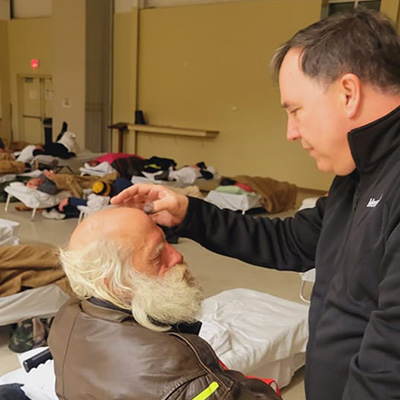
Father Ray Smith | Diocese of Springfield-Cape Girardeau, Missouri
Priest carries on Latin American missionary work among the poor in the Midwest
Father Ray Smith’s life of service to the Church and those in need began long before he entered the seminary. After graduating from Saint Joseph’s University in Philadelphia, he served as a lay missionary with the Franciscan Sisters of Baltimore. His work with them inspired him to serve as a residential counselor for adults with intellectual disabilities, at a program offered through the Archdiocese of Baltimore.
Father Smith later went on to serve the poor in Bolivia, Ecuador and El Salvador. These international experiences, along with his time caring for the underserved in the U.S., prepared him for his entrance into the Missionary Sons of the Immaculate Heart of Mary (also called the Claretian Missionaries), and he was ordained in 2016. Since then, his ministry has taken him to Mexico, the Philippines and Indonesia.
For the past three years Father Smith has been the pastor at Sacred Heart Church in Springfield, Missouri, a faith community Catholic Extension Society has supported for nearly 35 years.
-
Read more
Shortly after arriving in Springfield, Father Smith offered a retreat to his parishioners centered on his congregation’s founder, St. Anthony Mary Claret. The Claretian Missionaries’ charism is to “serve those most in need.” After attending this retreat, inspired parishioners approached Father Smith about doing something to help the homeless in Springfield. In response Father Smith started the Claret Shelter, which operates during winter months to give the homeless a place to escape the cold. He opened its doors two weeks earlier than expected to protect 20 men from a vicious Midwest snowstorm in February 2022.
Since the shelter opened, Father Smith has led efforts to raise over $70,000 for new heating, showers and laundry machines to provide to guests. Father Smith emphasizes the importance of the shelter’s Catholic presence. He commonly refers to it as “the Catholic shelter at Sacred Heart.” It is a place where all are welcome. For example, the day after Ash Wednesday in 2022, several homeless guests at the shelter asked if they could receive ashes. Father Smith gladly served them.
Father Smith sets the example for the team of volunteers he’s assembled, regularly picking up food and supplies and training anyone new who wants to help at the shelter. He is proud of the increase in volunteers that has made it possible to serve more men, multiple days a week. He sees this ministry as an opportunity for people from across Springfield to get to know one another and come together to help the less fortunate.
“My hope is the guests who come to us will know they haven’t been forgotten,” Father Smith said. “And that the community has come together to remind them that they are cared for, and they are loved by God and us.”
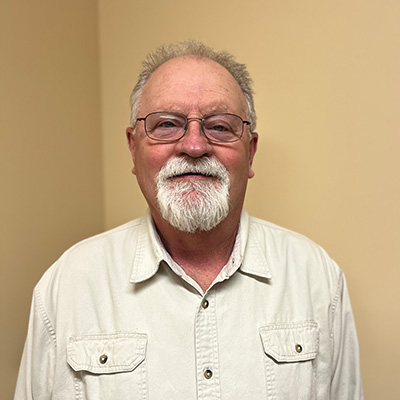
Tom Sullivan | Diocese of Steubenville, Ohio
Ohio volunteer motivates faith community to go beyond the walls of their church
One of Tom Sullivan’s favorite sayings is “Get back to Church.” Sullivan, an outgoing individual himself, invites everyone in his community to come to church at St. Ann Catholic Parish in Chesapeake, Ohio.
The Wheeler family was new to Chesapeake when they started attending St. Ann’s. It was Sullivan who gave them a warm welcome and asked them to join the growing group that goes for dinner after Mass. The Wheelers declined at first, but Sullivan’s kindness broke them down.
Sullivan knows the profound impact that a faith community can have—not only on parishioners like the Wheelers, but also on an entire town. A faith community can make a transformative mark outside of the parish itself, and that impact comes through a Church centered on mission.
-
Read more
Sullivan has spent the last 25 years leading by example through volunteering his time at a food pantry and clothing closet in Chesapeake, Community Mission Outreach. In his volunteer role, Sullivan helps serve over 300 families each month. He can be seen at the center doing just about everything, from loading grocery carts to packing items into cars to restocking shelves and cleaning up when the day is done.
Behind the scenes, he is leading the charge in recruiting volunteers, many from his parish at St. Ann’s. He sets a great example for everyone, as he is notably always the first to arrive to direct traffic on food-distribution days. More than anything, people notice that Sullivan is always ready with a smile, joke, word of encouragement and “God Bless you” to all who receive assistance through the pantry. His servant attitude helps make the center a welcoming place to those in need.
Each word of the center’s name—Community Mission Outreach—captures the heart of Sullivan’s values. He is always trying to build vibrant and transformative “community,” whether at his parish at St. Ann’s or through the pantry. He is a “mission”-focused individual who wants to help those that really need it most. And his “outreach” goes beyond the walls of his parish. He doesn’t see church as a club that’s about pleasing the members, but as a faith community that through its mission can extend its support to everyone—especially to those who are living life on the margins.
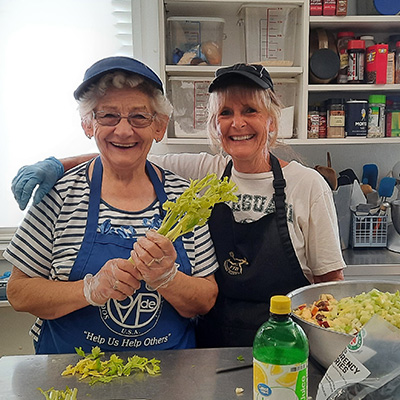
Superior District Council of the Society of St. Vincent de Paul | Diocese of Superior, Wisconsin
Northern Wisconsin ministry creates outpouring of love for those in greatest need
The Superior District Council of the Society of St. Vincent de Paul is a complete group-effort ministry. This council chapter has 87 members and countless volunteers. All joined forces to provide over 20,000 hours of service to those in need across northwest Wisconsin in the last year.
As a Catholic lay ministry, this society is more than an organization. It’s not just about membership, but rather it’s a sanctuary for spiritual growth and solidarity with the common goal of helping the less fortunate. Members and volunteers see the face of Christ in those they serve and show empathy, generosity and compassion toward those grappling with life’s hardships.
-
Read more
This ministry is well organized and spread out to make sure that no corner of northwest Wisconsin is left unattended to. The Superior Sacred Heart of Jesus Conference operates a free store for people to acquire food and clothing. The Rice Lake St. Joseph Conference has a thriving thrift store that funds a food pantry, meal program and home visit outreach. The Phillips St. Therese of Lisieux Conference offers two food pantries and a financial assistance helpline. And the Merrill St. Francis Xavier Conference operates a thrift store and outreach office, with its main efforts focused on providing financial assistance and shelter to those in need.
Four conferences, several lives touched. In the past year, the Superior District Council of the Society of St. Vincent de Paul conducted nearly 500 direct home visits and over 2,000 community visits—impacting over 5,000 individuals. Through the generosity of its members and volunteers, the council has been able to offer comfort to the brokenhearted, sustenance to the hungry and shelter to the homeless with boundless love. They have renewed faith in those they have helped.
One mother recently wrote to the council, “Thank you again for all your support and love from the Church and you. Things are finally turning around. I can feel the prayers being made over my life and the life of my child.”
“Though their acts of kindness may often go unnoticed by the world, the impact they leave behind resonates far beyond the walls of our parishes and communities,” said Bishop James Powers of the Diocese of Superior. “They are the silent champions who respond to the call to serve the most vulnerable among us.”
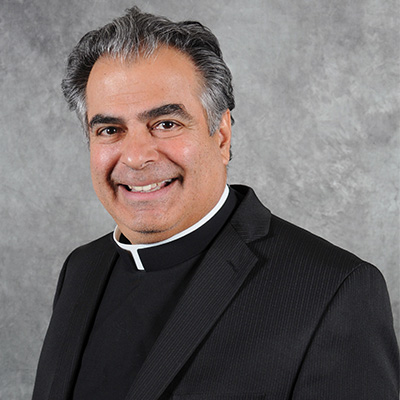
Monsignor Domenico Pinti | Diocese of Tucson, Arizona
How this accountant became a beloved priest
Domenico Pinti graduated from St. Vincent College in Latrobe, Pennsylvania – 40 miles southeast of Pittsburgh – with a degree in accounting. He was four years into a successful, prosperous career. Yet he wasn’t feeling fulfilled.
He started attending Mass daily, and multiple times during the weekend. It was at this time he decided to leave the safety of his accounting job and discern a call to the priesthood. “God can call at any age and any time,” Pinti said when looking back on his vocation. “I thought the joy of being a priest, of serving people, of waking up and listening to the scriptures and then going out and living them – nothing could be more fulfilling than that.”
Pinti was studying at Holy Apostles College & Seminary in Connecticut when a priest visiting from Tucson, Arizona, inspired him to head west. He was ordained a priest for the Diocese of Tucson on February 2, 1985. The next day, Msgr. Pinti celebrated his first Mass at St. George Catholic Parish in Apache Junction.
“The Lord calls everyone differently,” Miles said. “We don’t have to go across the world to do good. We just have to step outside and be open to people. It’s also walking with them. I’m learning with them as I’m telling them all of this.”
-
Read more
His first years of ministry took him to three different parishes in the diocese. On February 1, 2004, Msgr. Pinti was assigned as pastor of St. George, nearly 19 years to the day after celebrating his first Mass as a priest at the parish.
For the last 20 years, Msgr. Pinti has been a staple figure in Apache Junction. He’s known for starting the St. George “Help for the Needy” food pantry, which assists low-income families in the area. Truly living out his desire to help those in need, Msgr. Pinti does the majority of the shopping for the pantry himself.
Msgr. Pinti also travels to serve other missions in the area, including San Carlos Apache Mission, which Catholic Extension Society has supported for over 40 years.
Bishop Edward Weisenburger said of Msgr. Pinti, “Monsignor’s life of dedicated ministry reminds us of the transformative power of living the Gospel message in our daily lives.”
Living the scripture is what Msgr. Pinti set out to do when he became a priest. His generous spirit has made him beloved by the people he serves at St. George’s Parish, at the pantry, at the missions and all throughout the Apache community.
Three years as an accountant turned into nearly 40 years as a priest and a lifetime of fulfillment.
“It is important for me to do, to show, and to live God’s work as a happy priest,” Msgr. Pinti said. “And to be there for His people.”
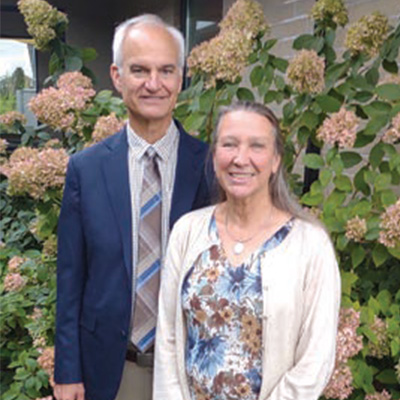
Dr. James and Roberta Guzek | Diocese of Yakima, Washington
Missionary couple perform hundreds of modern-day medical miracles
In Ethiopia, hundreds of people have received a life-changing gift at the hands of Dr. James Guzek: the gift of sight. When Jesus gave sight to the blind, he performed miracles. Each time Dr. Guzek performs the surgery that cures his patient’s blindness, he credits God for giving him this gift—the ability to completely change an entire family’s life with one procedure.
Every year, he uses his vacation days from his practice at the Pacific Cataract and Laser Institute in the Tri-Cities area of central Washington to go overseas to perform cataract surgeries. His team of volunteers performs dozens of surgical procedures that transform more than the life of the person whose sight is restored.
In Ethiopia, a child will become the full-time guide and caregiver of someone who has gone blind in their family. This means the child cannot attend school; they lose hope for a better life. One surgery “changes the future for generations to come,” said Dr. Guzek.
-
Read more
Dr. Guzek’s work as a missionary doctor has reached many other corners of the world, and he has even put his own life on the line to fulfill this mission. In the late 1980s, he spent three years in Sri Lanka, braving nearby shootings and bus bombings as civil war broke out. “God spoke to me and said, ‘Stay where you are,’” he said. When he returned home, he was shell-shocked, emaciated and sick with malaria.
In the following years he married Roberta, a nurse, and they began a family. But the desire to provide care in developing countries, to use his God-given talents among those suffering the most in the world, never left him.
In 1993, he and Roberta went to Ghana to work at a missionary hospital. With hardly any staff and crowds of people desperate for eye care, he was seeing over 100 patients a day. He trained and paid villagers out of his own pocket to help with the overwhelming need. After four years, he had trained 10 resident ophthalmologists to ensure his practice could continue beyond his departure.
He and Roberta and their children have performed medical mission trips in other countries as well, including Sudan and Ecuador.
“There is such joy in being in God’s providence,” Dr. Guzek said.
Dr. Guzek and Roberta are parishioners of St. Joseph Church in Kennewick, Washington. They thank their local community for supporting their far-reaching medical mission. “The prayers of the people here are so powerful,” Roberta said.
We are proud to honor all of the Lumen Christi Award Nominees for 2024. Learn more about the award here.

